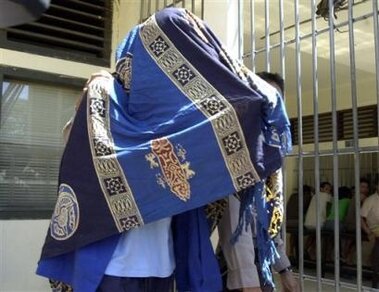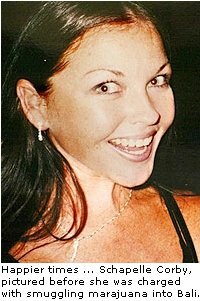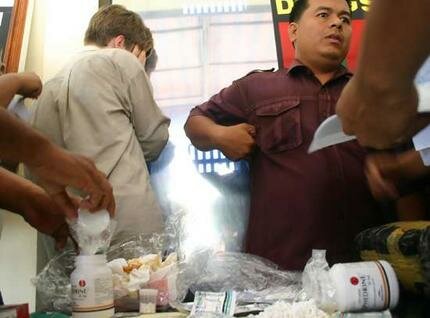|
By Cindy Wockner in Denpasar - August 27, 2005
 FIVE people were arrested when an Indonesian drug squad swooped on a dance party in Bali last week, but the name of only one has hit the headlines - Michelle Leslie. FIVE people were arrested when an Indonesian drug squad swooped on a dance party in Bali last week, but the name of only one has hit the headlines - Michelle Leslie.
The Adelaide model is not accused of the most serious offence nor thought to be a ring-leader.
The two ecstasy pills police say they found in her handbag is less than most of the other four are accused of possessing, and mS Leslie caused no trouble when arrested.
The reason the 24-year-old is the centre of swarming media attention is because she's Australian.
The man who ran the raids, Major Mardiaz Kusin, seemed almost miffed when, at a press conference to discuss the operation, no-one seemed much interested in the other four people arrested.
Miffed, but not surprised. An astute, drug squad officer, he could sense what was coming.
He'd seen it once, almost a year ago, when another young Australian, Schapelle Corby, was arrested for allegedly possessing marijuana, and then earlier this year, when nine Australians were apprehended in relation to a large seizure of heroin. 
Before them, there was a man with more than 50,000 ephedrine pills and, later, a businessman with a small amount of hashish. They were Australians, too.
And on the same weekend as Ms Leslie's arrest came the news that yet another Australian had been taken into custody in Sumatra on drug-possession charges.
Bali police were astute enough to anticipate the question on everyone's lips: Is there a police campaign to "get" Aussies, who for decades have regarded Bali as their party town; a fun-loving, freewheeling island where drugs and parties are everywhere if you so desire?
The short answer is no.
The increase in the number of Australians having to fight for justice, and their lives, is a result of several factors. They include: the fight against drugs in Indonesia generally, the cleaning up of a once-corrupt police force, and the focus on Indonesian-Australian relations after the 2002 Bali bombing.
In another era, someone such as Leslie may well have been home safely from Bali by now, with a story to tell friends about her brush with Indonesian law. But this is 2005 and the Indonesian Government is committed to a tough stand on drugs.
"Our younger generation are being threatened with ruin," General Sutanto, the then head of Indonesia's National Narcotics Agency, or BNN, said recently.
He was referring to the country's spiraling drug problem, with figures showing about 3.2 million Indonesians are drug users and that 78 per cent of these are people in their 20s.
General Sutanto is now the country's new national police chief and has ordered a nationwide crackdown, backed by President Susilo Bambang Yudhoyono.
Those such as General Sutanto and President Yudhoyono believe drugs have become the scourge of society, with figures showing that increasing numbers of high school students are using drugs, and that about 15,000 people die every year as a result of drug abuse.
On June 26, on the annual International Day Against Drug Abuse and Illicit Trafficking, President Yudhoyono sent a text message to millions of mobile-phone owners throughout the country.
 It said: "Stop drug abuse and drug-related crimes right now. Let us preserve and build a healthy, smart and progressive nation." It said: "Stop drug abuse and drug-related crimes right now. Let us preserve and build a healthy, smart and progressive nation."
And he highlighted how Indonesia had gone from being just a transit point for drug trafficking in Asia to one where drugs are now being produced and consumed in ever increasing amounts.
All this despite Indonesia, like its South-East Asian neighbours, employing a rigid and unforgiving anti-drugs regime, with death as the ultimate deterrent.
There's a concerted bid to put a halt to the problem. It has resulted in a larger presence of anti-drugs police and not just in Bali.
Raids on trendy Jakarta night-spots frequented by the A-list are becoming common. During a recent round-up about 100 people were arrested in a single night.
It's not just in Bali, and it's not just Australians who are facing the wrath of law-makers and law-enforcers, sick of watching the damage wrought by drug abuse and determined to do something about it.
Bali's drug squad chief, Lt-Col Bambang Sugiarto, makes no apologies for the aggressive campaign and says Australians finding themselves behind bars as a result is nothing more than coincidence. He says there's no campaign to target Australians.
"We don't differentiate. Whether they're Indonesian citizens, Australian, Asian or European, we treat them all the same. The law is the same for high-class, middle-class and low-class," he says.
Lt-Col Sugiarto points out that the number of Australian visitors to Bali is second only to the Japanese, so it's only natural that Aussies, if they're involved with drugs while in Bali, might find themselves on the wrong side of the law.
But he admits "surprise" that after all the publicity and controversy surrounding the Corby case, Australians aren't more wary of bringing in or using drugs.
When it comes to violations of drug laws, he says, tourists and locals are treated just the same.
Lt-Col Sugiarto says that under the former police chief, anti-drug campaigns were an order, but that under the new police chief they're even more strenuously pursued.
Hence, the increasing numbers of undercover cops posing as drug dealers, especially around the Kuta area in Bali, to lure unsuspecting purchasers, and the raids on dance parties, such as last Friday night's Vertigo Goes to Bali party, where Michelle Leslie's problems began.
He says that in addition to this active policing, the force has employed a series of preventative measures - leaflets, stickers, signs and posters pointing out the harsh penalties for drugs and the evils of the drug trade.
International tourists to Bali can be in no doubt about the fate awaiting drug dealers. Even before they get through Customs, the first sign is hard to miss: "Death penalty for drug traffickers".
Another reason we may now be hearing more about Aussies arrested in Bali relates to a gradual cultural change in the police force, along with an increased media awareness of the intense interest in any arrest involving an Australian.
It's been no secret in the past that if you were a policeman, the drug squad was the division to aspire to - it was where the big bribes could be demanded and received.
There is no shortage of anecdotal evidence of drug-squad officers with inexplicably palatial homes and expensive cars.
These days, however, with Dr Yudhoyono ordering a crackdown on corruption and a clean-up of the police force and the judiciary, it's become more difficult - even to bribe a traffic cop, to whom it used to be easy to hand over a few dollars to avoid a traffic violation.
This, coupled with the intense media focus on Bali, has made the occasional bribe much harder to pull off.
Since the 2002 Bali bombing, Indonesian media have become very attuned to what is news in Australia - it means a lot of money if they can sell good TV footage or pictures to Australian outlets on the side.
That escalated after the arrest a year ago of Corby.
Bali media were holding gold if they had obtained good footage of her, able to sell it to media outlets for hundreds of dollars, the equivalent of a few months salary.
Every time an Australian is arrested in Indonesia now, the media know they are on to a good thing.
The news gets out quickly and it's always more difficult to make a case go away or to make evidence disappear (with the help of cash) when the media spotlight is on.
There's really only one solution. Don't dare take, use or experiment with drugs if you're in Bali or anywhere in Indonesia.
|